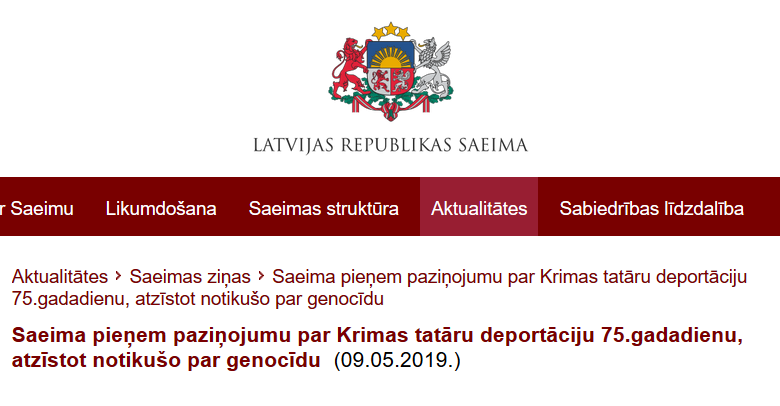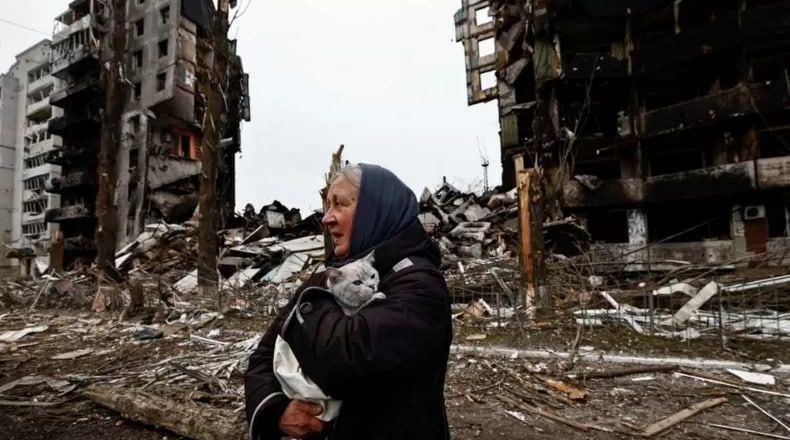On 7 March, the ICJ started examining examine Ukraine’s lawsuit against the Russian Federation over Putin’s invasion of Ukraine, which began on February 24, 2022 – the case concerning ‘Allegations of Genocide under the Convention on the Prevention and Punishment of the Crime of Genocide (Ukraine v. Russian Federation)’. The International Court of Justice (ICJ) in The Hague agreed to hold an urgent hearing and is due to make an interim emergency decision in the near future.
Russia boycotts trial, claiming “absurdity” of case
Russia boycotted the proceedings, leaving an empty row reserved for its lawyers in the chamber. On 8 March, the Russian side should have presented its position, but because of the latter’s absence, the Court now moves towards making a decision.
Russia’s self-removal only accelerated the process. The Court will announce its decision at a public hearing, the date of which must be announced further.
And given the urgency of the situation and the fact that without the participation of the Russian Federation, the procedures have been reduced, there is every chance that decisions can be made and made public in about a week, European Pravda writes.
In a 9 March tweet by Russia’s Foreign Ministry, its first public statement on the matter, it claimed the “absurdity” of the suit.
But, why did Ukraine not file a lawsuit against Russia in 2014, when Russian forces invaded Crimea and certain parts of Donetsk and Luhansk Oblasts in the Donbas?
The fact is that this time the Kremlin was caught red-handed. In fact, Russia exposed its own lies when Moscow began justifying its invasion by claiming that Ukraine had launched “genocide of Russian-speakers”.
Thus, Ukraine could initiate proceedings against Russia without its consent.
The Government of Ukraine is represented by Anton Korynevych, Permanent Representative of the President of Ukraine in the Autonomous Republic of Crimea, as Agent and Oksana Zolotaryova, Director, International Law Department, Ministry of Foreign Affairs of Ukraine, as Co-Agent.
Ukraine argued that Russia had wrongly tried to justify its invasion on false assertions that it was attacking in self defence to prevent genocide.
A “horrible lie”
The Ukrainian delegation presented its arguments on March 7. Head Agent Anton Korynevych delivered the opening speech, while Co-Agent Oksana Zolotaryova made the closing statement. The Russian delegation did not attend the meeting and the Russian Embassy in the Netherlands refused to comment.
“We are here today in this building called the Peace Palace, but at home, my country faces a war of aggression. I am standing here in a room called a Great Hall of Justice, but at home, my countrymen see only the injustice of Russia’s bombs and missiles falling on our cities and neighborhoods.
As I stand before the Court, Ukrainians are under deadly attacks. Millions of people are in imminent danger. The UN’s top human rights official warns that there are significant civilian casualties.” began Korynevych.
Anton Korynevych added that Russia’s empty seats at the ICJ spoke powerfully of Russia’s stance and urged the Russian Federation to lay down its weapons and put forward concrete evidence of its ‘genocide claims’. He concluded by stating that “Russia must be stopped, and the Court has a role to play in stopping it.”
In her closing statement, Oksana Zolotaryova pointed out that Russia is using “this horrible lie” as a pretext for its invasion of Ukraine, thus abusing the Genocide Convention. Furthermore, hiding behind this fallacious pretext, Russia is committing blatant war crimes and crimes against humanity in Ukraine.
What Ukraine expects from the ICJ
Summing up, Zolotaryova announced that Ukraine requests the following provisional measures:
- The Russian Federation shall immediately suspend the military operations commenced on 24 February 2022 that have as their stated purpose and objective the prevention and punishment of a claimed genocide in the Luhansk and Donetsk Oblasts of Ukraine.
- The Russian Federation shall immediately ensure that any military or irregular armed units which may be directed or supported by it, as well as any organizations and persons which may be subject to its control, direction or influence, take no steps in furtherance of the military operations which have as their stated purpose and objective preventing or punishing Ukraine for committing genocide.
- The Russian Federation shall refrain from any action and shall provide assurances that no action is taken that may aggravate or extend the dispute that is the subject of this Application, or render this dispute more difficult to resolve.
- The Russian Federation shall provide a report to the Court on measures taken to implement the Court’s Order on Provisional Measures one week after such order and then on a regular basis to be fixed by the Court.
To justify the invasion, Putin and other Russian officials announced that Russia’s actions were justified under Article 51 of the UN Charter. Article 51 provides that “nothing in the present charter shall impair the inherent right of individual or collective self-defense if an armed attack occurs against a member of the United Nations.” However, Ukraine did not commit or threaten to commit an armed attack against Russia or any other UN member state.
Moreover, Putin’s claim that Ukraine was committing genocide against Russian-speakers in Donetsk and Luhansk Oblasts is also not supported by facts or evidence and would not, in any case, give Russia a right to launch an invasion of Ukraine.
What impact the court’s decision may have
Professor Harold Hongju Koh summarized Ukraine’s position and the requested provisional measures. The most interesting part of his passionate and eloquent speech is a policy argument on the long-term impact of the court’s decision in this case on the role of international law and the rule-based world order.
Russia, a permanent member of the UN Security Council, implements a premeditated and naked act of aggression against its innocent neighbor based on the false pretext of “genocide,” Koh said:
“This case is fundamentally about Russia’s lies. Russia lies about the facts, when it claims that Ukraine is committing genocide. Russia lies about the law, when it claims that its obligation to prevent genocide entitles it to launch a punitive ‘special military operation’ against so-called “neo-Nazis” that we all recognize as an offensive war of aggression and atrocity against Ukraine’s peaceful people.”
He pointed out that while claiming to act to prevent and punish genocide in eastern Ukraine, Russia has unleashed a military onslaught that is in no way limited to eastern Ukraine, which belies its justification for its actions. Koh stressed that Russia had a wealth of options to address perceived genocide through international law but had chosen a military invasion instead.
As well, he stressed that the targeting of Ukrainian civilians and civilian infrastructure can never, under any circumstance, be a lawful exercise of a country’s obligation to prevent genocide.
Koh pointed out that until now, the situation Russia created was contemplated only in the hypothetical.
Under the circumstances, the court has no right to remain idle, Koh stressed, otherwise, it would greenlight similar actions in the future, not only by Russia.
“If this Court cannot decisively order Russia to stop its military actions, grounded in flagrant abuse of and disrespect for the Genocide Convention, why should any Permanent-5 United Nations Member see international law as a meaningful obstacle to whatever it might perceive as ‘necessary military action’? Then why would we not be forced to concede that the post-war international legal project has failed?”
On the contrary, the court’s order should be the “essential spark” that will inspire the work of other international institutions dealing with Russian aggression, war crimes, and human rights violations:
- the United Nations General Assembly,
- the International Criminal Court,
- the United Nations Human Rights Council,
- the European Court of Human Rights,
- regional organizations and nation-States,
- and national prosecutors.
Ultimately, the case is about Russia’s destruction of the post-WWII legal order, which arose to prevent actions such as Russia’s invasion.
“In less than two weeks, this case has become much bigger than just Ukraine versus Russia. It has become a test of who will prevail: Russia or the post-war international legal order. The tragedy we are all witnessing in the streets of Kyiv, Kharkiv, Mariupol, Kherson, Volnovakha and so many other Ukrainian cities is precisely what our modern international legal system was designed to prevent,” Koh stressed.
The International Court of Justice (ICJ) is the highest court for resolving disputes between states. However, cases usually take years, so the ICJ is using its fast-track procedure to look at Ukraine’s requests for “provisional measures”.
Judgments delivered by the Court (or by one of its Chambers) in disputes between states are binding. However, the ICJ has no way of enforcing its decisions.
Apart from this lawsuit filed to the International Court of Justice in The Hague, Ukraine has also submitted several requests to the European Court of Human Rights (ECHR).






